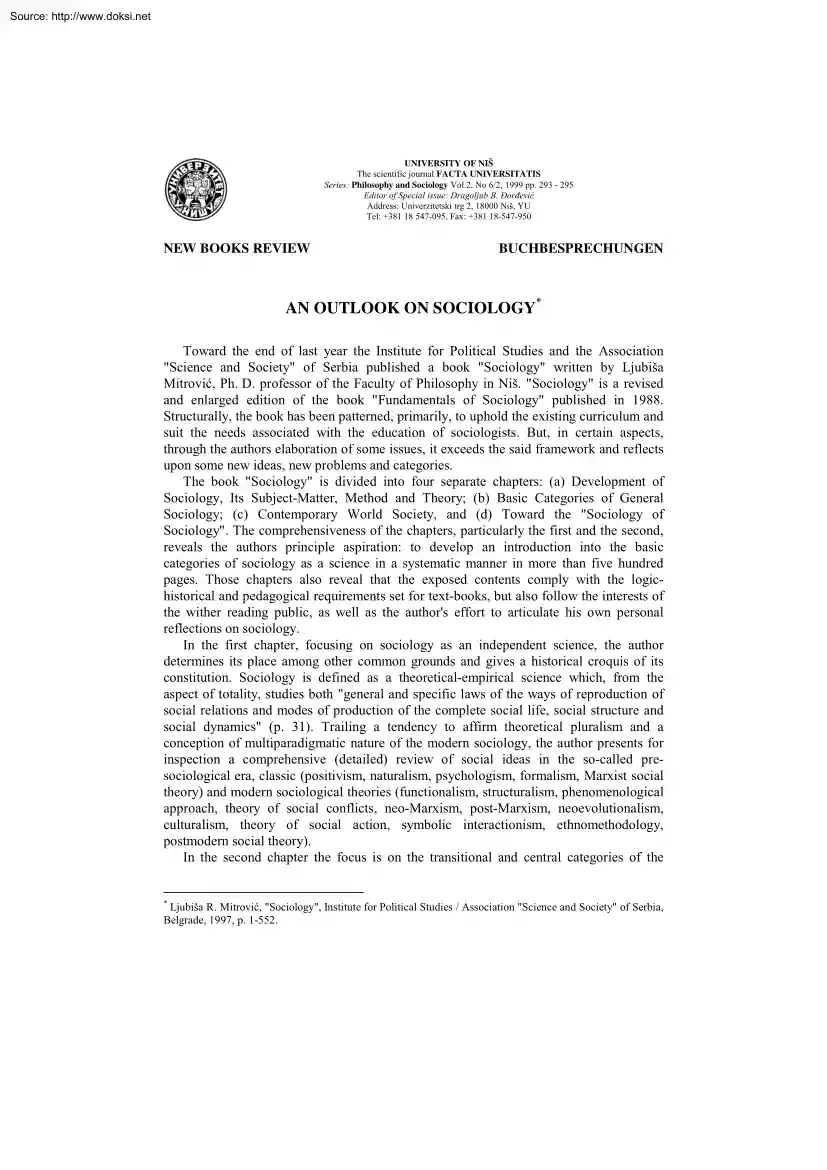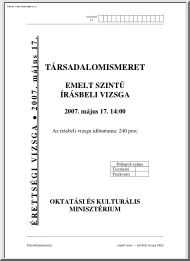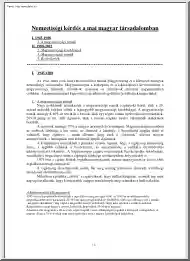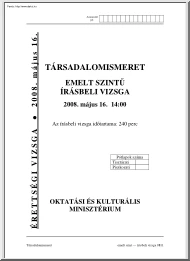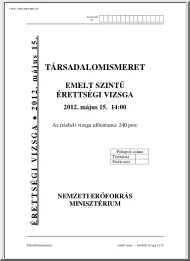Datasheet
Year, pagecount:2001, 3 page(s)
Language:English
Downloads:2
Uploaded:June 04, 2018
Size:530 KB
Institution:
-
Comments:
University of NIS
Attachment:-
Download in PDF:Please log in!
Comments
No comments yet. You can be the first!Most popular documents in this category
Content extract
Source: http://www.doksinet UNIVERSITY OF NIŠ The scientific journal FACTA UNIVERSITATIS Series: Philosophy and Sociology Vol.2, No 6/2, 1999 pp 293 - 295 Editor of Special issue: Dragoljub B. Đorđević Address: Univerzitetski trg 2, 18000 Niš, YU Tel: +381 18 547-095, Fax: +381 18-547-950 NEW BOOKS REVIEW BUCHBESPRECHUNGEN AN OUTLOOK ON SOCIOLOGY* Toward the end of last year the Institute for Political Studies and the Association "Science and Society" of Serbia published a book "Sociology" written by Ljubiša Mitrović, Ph. D professor of the Faculty of Philosophy in Niš "Sociology" is a revised and enlarged edition of the book "Fundamentals of Sociology" published in 1988. Structurally, the book has been patterned, primarily, to uphold the existing curriculum and suit the needs associated with the education of sociologists. But, in certain aspects, through the authors elaboration of some issues, it exceeds the said framework and
reflects upon some new ideas, new problems and categories. The book "Sociology" is divided into four separate chapters: (a) Development of Sociology, Its Subject-Matter, Method and Theory; (b) Basic Categories of General Sociology; (c) Contemporary World Society, and (d) Toward the "Sociology of Sociology". The comprehensiveness of the chapters, particularly the first and the second, reveals the authors principle aspiration: to develop an introduction into the basic categories of sociology as a science in a systematic manner in more than five hundred pages. Those chapters also reveal that the exposed contents comply with the logichistorical and pedagogical requirements set for text-books, but also follow the interests of the wither reading public, as well as the authors effort to articulate his own personal reflections on sociology. In the first chapter, focusing on sociology as an independent science, the author determines its place among other common grounds and
gives a historical croquis of its constitution. Sociology is defined as a theoretical-empirical science which, from the aspect of totality, studies both "general and specific laws of the ways of reproduction of social relations and modes of production of the complete social life, social structure and social dynamics" (p. 31) Trailing a tendency to affirm theoretical pluralism and a conception of multiparadigmatic nature of the modern sociology, the author presents for inspection a comprehensive (detailed) review of social ideas in the so-called presociological era, classic (positivism, naturalism, psychologism, formalism, Marxist social theory) and modern sociological theories (functionalism, structuralism, phenomenological approach, theory of social conflicts, neo-Marxism, post-Marxism, neoevolutionalism, culturalism, theory of social action, symbolic interactionism, ethnomethodology, postmodern social theory). In the second chapter the focus is on the transitional and
central categories of the * Ljubiša R. Mitrović, "Sociology", Institute for Political Studies / Association "Science and Society" of Serbia, Belgrade, 1997, p. 1-552 Source: http://www.doksinet 294 D. TODOROVIĆ Marxist sociology. In reference to the different approaches to this problem in the domestic literature, the author highlights social affairs as a starting category in the explanation of the concept of society, and mode of production of the social life as a central category of the sociological analysis. Accordingly, the objective of sociology is to analyze the position and role of the man, "social groups, classes and movements in the process of production of the social life in the global society as well as in the historical development of the human society in general" (p. 237) Starting from the said categories, the focus moves to the derived categories bearing significance for the social structure and social dynamics, such as: labor and
division of labor, social groups, culture, forms of social movements, social conflicts and the like. The analysis of the Marxian comprehension of society includes substantial ideas of the creator of the dialectic theory relevant for the general sociology. After this interpretation, the author presents his own ideas about the problem at issue, which is, otherwise, a characteristic of the entire book. The third chapter is a presentation of the typology of global societies, the basic direction of global social changes in the world, connections between the scientifictechnological revolution and global social changes, the nature of post-socialist societies, a concept of transition and participative democracy. The essential feature of the modern world society, as emphasized by the author, is that it is undergoing major changes - from a revolution in the mode of production to the one in the way of living. This has been directly caused by the global social changes, primarily in the area of
technology, economy, communication systems, infrastructure and informatics. They have given rise, on the one hand, to a high degree of inter-integrity and interdependence, and, on the other, to class-interest separateness and oppositeness of the modern world. The nature of those changes is massively determined by the repercussions of the scientific-technological revolution which is perceived as a technological, developmental, social and civilizational paradigm. This is observable on the example of post-socialist societies whose trends of development depend on the series of objective and subjective, internal and international factors, as well as on the strategy of the global social development. The attainment of the pattern of a modern pluralistic social-democratic society requires from ex-realsocialist countries, as emphasized, a specific democratic political culture, consensus and social partnership of the social protagonists, as well as a new developmental strategy aimed at
modernization and democratization. The fourth chapter is an attempt to articulate theoretically a demand for the constitution a sociology of sociology which would study the development of sociology as a science and as a profession in the world. The author presents his attitude that there is a need for a systematic study of sociology, a study which would not be merely limited to the history of the development of specific national and regional sociologies, but would also include the current state and tendencies of their development, with no intention to create a new academic discipline in a jagged system of sociological sciences in an artificial manner. In that sense, sociology of sociology should explore the social and gnoseologica determinants of the emergence and development of national and regional sociologies, the development of sociology as a science, vocation and profession", as well as their role in the development of specific societies (p. 502) A critical sociological
examination of sociology would help towards a more comprehensive understanding of the current state, problems, cross-roads and tendencies in the development of the modern sociology, to our apprehension of the function of sociology in the society and to the determination of its Source: http://www.doksinet An Outlook on Sociology 295 relationship with other social protagonists. Upon presenting this sketch of the contents of all four chapters of the book, we draw your attention to a fact of high significance for the text-book literature. Professor Mitrović specifies and defines each concept which supposedly might cause misunderstandings. This enables easier reading of the book, while the authors functional use of numerous references provides opportunities for a better illustration of his attitudes. Diversity and composition of the elaborated topics make this reading material interesting to all the people who want to adopt systematic knowledge on the relationship between sociology
and society. The book "Sociology" of Prof Ljubiša Mitrović, being scientifically grounded, is a significant contribution to the Yugoslav professional literature as well as a stimulus to the readers contemplation on the position and destiny of the present-day sociology. Dragan Todorović
reflects upon some new ideas, new problems and categories. The book "Sociology" is divided into four separate chapters: (a) Development of Sociology, Its Subject-Matter, Method and Theory; (b) Basic Categories of General Sociology; (c) Contemporary World Society, and (d) Toward the "Sociology of Sociology". The comprehensiveness of the chapters, particularly the first and the second, reveals the authors principle aspiration: to develop an introduction into the basic categories of sociology as a science in a systematic manner in more than five hundred pages. Those chapters also reveal that the exposed contents comply with the logichistorical and pedagogical requirements set for text-books, but also follow the interests of the wither reading public, as well as the authors effort to articulate his own personal reflections on sociology. In the first chapter, focusing on sociology as an independent science, the author determines its place among other common grounds and
gives a historical croquis of its constitution. Sociology is defined as a theoretical-empirical science which, from the aspect of totality, studies both "general and specific laws of the ways of reproduction of social relations and modes of production of the complete social life, social structure and social dynamics" (p. 31) Trailing a tendency to affirm theoretical pluralism and a conception of multiparadigmatic nature of the modern sociology, the author presents for inspection a comprehensive (detailed) review of social ideas in the so-called presociological era, classic (positivism, naturalism, psychologism, formalism, Marxist social theory) and modern sociological theories (functionalism, structuralism, phenomenological approach, theory of social conflicts, neo-Marxism, post-Marxism, neoevolutionalism, culturalism, theory of social action, symbolic interactionism, ethnomethodology, postmodern social theory). In the second chapter the focus is on the transitional and
central categories of the * Ljubiša R. Mitrović, "Sociology", Institute for Political Studies / Association "Science and Society" of Serbia, Belgrade, 1997, p. 1-552 Source: http://www.doksinet 294 D. TODOROVIĆ Marxist sociology. In reference to the different approaches to this problem in the domestic literature, the author highlights social affairs as a starting category in the explanation of the concept of society, and mode of production of the social life as a central category of the sociological analysis. Accordingly, the objective of sociology is to analyze the position and role of the man, "social groups, classes and movements in the process of production of the social life in the global society as well as in the historical development of the human society in general" (p. 237) Starting from the said categories, the focus moves to the derived categories bearing significance for the social structure and social dynamics, such as: labor and
division of labor, social groups, culture, forms of social movements, social conflicts and the like. The analysis of the Marxian comprehension of society includes substantial ideas of the creator of the dialectic theory relevant for the general sociology. After this interpretation, the author presents his own ideas about the problem at issue, which is, otherwise, a characteristic of the entire book. The third chapter is a presentation of the typology of global societies, the basic direction of global social changes in the world, connections between the scientifictechnological revolution and global social changes, the nature of post-socialist societies, a concept of transition and participative democracy. The essential feature of the modern world society, as emphasized by the author, is that it is undergoing major changes - from a revolution in the mode of production to the one in the way of living. This has been directly caused by the global social changes, primarily in the area of
technology, economy, communication systems, infrastructure and informatics. They have given rise, on the one hand, to a high degree of inter-integrity and interdependence, and, on the other, to class-interest separateness and oppositeness of the modern world. The nature of those changes is massively determined by the repercussions of the scientific-technological revolution which is perceived as a technological, developmental, social and civilizational paradigm. This is observable on the example of post-socialist societies whose trends of development depend on the series of objective and subjective, internal and international factors, as well as on the strategy of the global social development. The attainment of the pattern of a modern pluralistic social-democratic society requires from ex-realsocialist countries, as emphasized, a specific democratic political culture, consensus and social partnership of the social protagonists, as well as a new developmental strategy aimed at
modernization and democratization. The fourth chapter is an attempt to articulate theoretically a demand for the constitution a sociology of sociology which would study the development of sociology as a science and as a profession in the world. The author presents his attitude that there is a need for a systematic study of sociology, a study which would not be merely limited to the history of the development of specific national and regional sociologies, but would also include the current state and tendencies of their development, with no intention to create a new academic discipline in a jagged system of sociological sciences in an artificial manner. In that sense, sociology of sociology should explore the social and gnoseologica determinants of the emergence and development of national and regional sociologies, the development of sociology as a science, vocation and profession", as well as their role in the development of specific societies (p. 502) A critical sociological
examination of sociology would help towards a more comprehensive understanding of the current state, problems, cross-roads and tendencies in the development of the modern sociology, to our apprehension of the function of sociology in the society and to the determination of its Source: http://www.doksinet An Outlook on Sociology 295 relationship with other social protagonists. Upon presenting this sketch of the contents of all four chapters of the book, we draw your attention to a fact of high significance for the text-book literature. Professor Mitrović specifies and defines each concept which supposedly might cause misunderstandings. This enables easier reading of the book, while the authors functional use of numerous references provides opportunities for a better illustration of his attitudes. Diversity and composition of the elaborated topics make this reading material interesting to all the people who want to adopt systematic knowledge on the relationship between sociology
and society. The book "Sociology" of Prof Ljubiša Mitrović, being scientifically grounded, is a significant contribution to the Yugoslav professional literature as well as a stimulus to the readers contemplation on the position and destiny of the present-day sociology. Dragan Todorović
